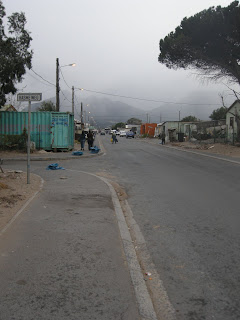My boss noticed that I was not looking so good. I was strongly urged to take my first Rest and Relaxation vacation. Now I see why these trips are necessary. I decided to visit South Africa (SA). I have an old friend Capetown. I stayed with her family which included a young boy of 3 called Boyou. SA was quite cold; it was the middle of winter. Capetown is glorious. And Boyou was such a joy. It is sooo much energy to take care of a child, but at the end of the day I had good energy. I have to say that the my friends helped me have a great time.. by letting me not plan a thing. And Boyou was the best part of it.
I also went to visit the Townships; area where black people live. I went to Mazapulele Township, right next door. The xenophobic attacks also occurred in Capte town, however I heard that the Mazapulele township elders really organized the community. They were able to convince the people who looted the foreigner’s homes to return their property. And they also got the community to really reconsider their position of violence. It was quite a exciting to hear. A people who have experience so much violence, yet choosing a different action. The situation in the townships is not always so pretty due to the poverty of blacks in general. One good thing though, is that these homes have running water and electricity. However the townships are not large enough and there are many slums. I saw acres and acres of slums on the way to the capetown airport. Quite disheartening. I hope that SA can really begin to bridge the gap for poor SA's.
A few scenes of my time in capetown. If you have a chance, I think it is a beautiful place to visit.






Muzaphalele township


Muzaphalele township (above)





JOHANESSBURG
I also got to visit my friend in Johannesburg. Quite a city. The walls protecting the homes are so high, with electric wires on top. There is a lot of crime in the city, most probably due to the huge disparity between the rich and poor. The city felt very unfriendly. I think it takes a while to feel comfortable here. I got to see the famous SOWETO and Mandela's home from his childhood.



Now back to my live in Juba.












